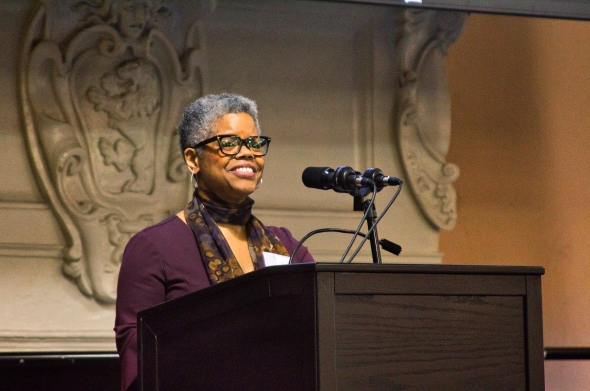Experts Talk Disaster Resilience & Recovery at Stetson Law

Over a two-day workshop on the Stetson Law campus, legal professionals, local and state officials, nonprofit organizations, and thought leaders gathered to explore strategies to more effectively meet the needs of individuals and communities as they prepare for, experience, and recover from disasters.
Led by nonprofit Equal Justice Works and cohosted by the American Bar Association and American Bar Association Young Lawyers Division Disaster Legal Services, “Building Community Resilience Through Advocacy and Systemic Change” was the immersive event’s theme.
There was a long list of recent disasters from which they drew insights – Hurricane Ian, the global Covid-19 pandemic, the earthquake in Turkey, and even the onslaught of climate change. They shared their own experiences with these disasters and how they can inform strategies for building a stronger approach to disaster resiliency and recovery, especially for society’s most vulnerable.
An unexpected octopus’s climate connection
The first keynote speaker was Robert R.M. Verchick, Gauthier-St.Martin Chair in Environmental Law and Professor at Loyola University New Orleans and Senior Fellow at the Tulane University Disaster Resilience Leadership Academy.
He began his speech with a story of an octopus that went viral on social media in 2016 after a combination of factors – including a Super Moon, the King Tide, and storm surge, resulted in an octopus splashing into the parking garage of a Miami condominium tower.
It inspired him to coauthor a Miami Herald column titled “The Octopus in the Parking Garage.” Later, he wrote a full-length book of the same name.
To Verchick, the octopus incident is a less intimidating way to talk about climate change.
“This was a story that wasn’t so scary, and that was good. Because I want to make sure that people face the scary and important parts of climate change without freezing up,” Verchick said. “Because when we freeze up, nothing happens.”
Humanity is facing a “no-analog future,” he said, one in which a fossil fuel-reliant power grid will repeatedly fail due to extreme weather, the economy will lose trillions over time, and communities of color will bear the brunt of it all. With no precedent, there’s no telling how it will all unfold.
“We don’t know how fast the changes are going to be, we do know that they’re going to happen,” he said.
Verchick said while it’s impossible to stop at least some of the impacts of decades of CO2 emissions, taking action now can at least reduce future impacts. It’s not a pass-fail exam, he said, but a matter of reducing harm; curbing fuel emissions and building resilient infrastructure can earn us a B or C – and both are better than an F.
Disaster Response & Recovery at the local level
With Hurricane Ian and other major events in recent memory, a panel of local leaders held an in-depth discussion on the roles local emergency management agencies and community partners play as a disaster looms and after it passes.
Speakers discussed disaster response mechanisms and the importance of collaboration among private and public organizations – and how critical it is to be nimble.
The panel consisted of Joe Barrios of Pinellas County’s Emergency Management department, Michelle Luckett, CEO of the BeReady Alliance, Bay Area Legal Services staff attorney John Lawless, Florida Division of Emergency Management general counsel Stephanie Stachowicz-Twomey, and Jason Susalla, Grant Project Manager for the Disaster Relief Team at Bay Area Legal Services.
It is often on local agencies to accurately assess the extent of damage, Barrios said, so state and federal authorities can offer the correct amount of support.
To correctly assess a community’s need, the panel agreed, it’s important to make survivors feel as comfortable as possible. This could mean helping them navigate a Federal Emergency Management Agency assistance application – which, Luckett noted, is written at the 13th grade level – or, simply, listening.
“It takes a survivor at least five times to tell their story before they can start moving ahead,” Luckett said.
Putting it all together with Equal Justice Works’ Verna Williams
The conference culminated with remarks from Verna Williams, CEO of Equal Justice Works, a nonprofit that connects aspiring public interest lawyers to opportunities in the field.
Disaster recovery – especially for people and families unable to afford legal representation but don’t qualify for legal aid – is extremely complex and requires collaboration across organizations and sectors.
“They require us to act creatively and collaboratively to do what we couldn’t possibly do alone,” she said of disasters. “If the recent past is any indication, working across borders, organizations, and even disciplines will be essential to weather the storms that keep on coming.”
Williams’ background includes teaching and practicing law, researching civil and women’s rights, and serving as the dean of the University of Cincinnati College of Law. She noted that the World Justice Project ranks the U.S. 114th out of 140 nations in terms of accessibility and affordability of civil legal justice. Of the richest countries in the world, she added, the U.S. ranked 32nd out of 43. It is, she said, an “abysmal and untenable state of affairs” that makes disaster recovery significantly more challenging – from FEMA claims to insurance issues.
“These are all complex and difficult matters to navigate alone,” Williams said. “With disasters becoming more severe and causing greater destruction, there is overwhelming need for lawyers who can help individuals and families navigate these challenges and take the necessary steps toward some degree of normalcy.”
Mobilizing public assistance lawyers to help achieve this is the core of her organization’s work, she said, and a major motivation for launching the conference. Investing in long-term resilience involves cross-sector planning and partnership-building among agencies, nonprofits, faith-based organizations and other groups, Williams added.
“Doing so means impacted communities will have the necessary resources to recover more quickly and effectively,” she said.
Post date: March 21, 2023
Media contact: Kate Bradshaw
[email protected] | 727-430-1580